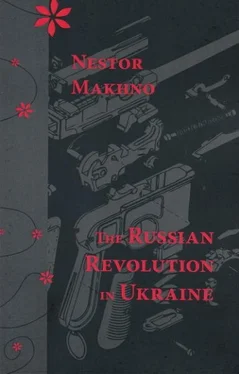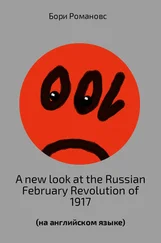Nestor Makhno - The Russian Revolution in Ukraine
Здесь есть возможность читать онлайн «Nestor Makhno - The Russian Revolution in Ukraine» весь текст электронной книги совершенно бесплатно (целиком полную версию без сокращений). В некоторых случаях можно слушать аудио, скачать через торрент в формате fb2 и присутствует краткое содержание. Город: Edmonton, Год выпуска: 2007, Издательство: Black Cat Press, Жанр: Биографии и Мемуары, на английском языке. Описание произведения, (предисловие) а так же отзывы посетителей доступны на портале библиотеки ЛибКат.
- Название:The Russian Revolution in Ukraine
- Автор:
- Издательство:Black Cat Press
- Жанр:
- Год:2007
- Город:Edmonton
- ISBN:нет данных
- Рейтинг книги:5 / 5. Голосов: 1
-
Избранное:Добавить в избранное
- Отзывы:
-
Ваша оценка:
- 100
- 1
- 2
- 3
- 4
- 5
The Russian Revolution in Ukraine: краткое содержание, описание и аннотация
Предлагаем к чтению аннотацию, описание, краткое содержание или предисловие (зависит от того, что написал сам автор книги «The Russian Revolution in Ukraine»). Если вы не нашли необходимую информацию о книге — напишите в комментариях, мы постараемся отыскать её.
The Russian Revolution in Ukraine
The Russian Revolution in Ukraine — читать онлайн бесплатно полную книгу (весь текст) целиком
Ниже представлен текст книги, разбитый по страницам. Система сохранения места последней прочитанной страницы, позволяет с удобством читать онлайн бесплатно книгу «The Russian Revolution in Ukraine», без необходимости каждый раз заново искать на чём Вы остановились. Поставьте закладку, и сможете в любой момент перейти на страницу, на которой закончили чтение.
Интервал:
Закладка:
Nestor Makhno
THE RUSSIAN REVOLUTION IN UKRAINE
(MARCH 1917 — APRIL 1918)
Dedication
I dedicate this volume to the memory of my dead friends and comrades who struggled with me to organize revolutionary Ukrainian workers to bring about a free, anarchist communist society:
Peter Gavrilenko, Alexander Kalashnikov, Moise Kalinichenko, Simon Karetnik, Philip Krat, Isidor (Peter) Lyutyi, Alexis Marchenko, Savva Makhno, Andrei Semenyuta, Gabriel Troyan, Stepan Shepel, Boris Veretelnik, Kh. Gorelik, Pavel Korostilev (Khundai), Luc Panchenko, Abram Shnayder, and others.
They perished under various circumstances but always in pursuit of the same goal: the realization and putting into practice of the concepts of liberty, equality, and free labour.
Nestor MakhnoPreface
On the occasion of publishing the initial volume of “The Russian Revolution in Ukraine” I find it necessary to add a few words of explanation.
In the first place, I must advise the reader that this work lacks a number of important documents: the resolutions and proclamations of the Gulyai-Pole Union of Peasants, the Soviet of Workers’ and Peasants’ Delegates, and their ideological driving force—the Gulyai Pole Peasant Anarcho-Communist Group. The Anarcho-Communist Group struggled to unite the peasants and workers of the Gulyai-Pole region under its own banners. Always in the vanguard of the revolutionary movement, the Anarcho-Communist Group explained to the peasants and workers the significance of unfolding events, clarifying the goals of the workers in general as well as the aims of the anarcho-communist movement which in spirit most closely approaches the peasant mentality.
Secondly, this volume lacks photographs of the members of the Gulyai-Pole Peasant Group of Anarcho-Communists, which, accompanied by brief biographical notes, would have occupied the first place in this volume. This group formed an essential part of the Russian Revolution in Ukraine and was the guiding force of the movement to which it gave rise, the “Revolutionary Makhnovshchina ”.
The theory and practice of this movement lead to a whole range of very important issues which I am trying to present to the workers of the world for discussion.
How fitting it would have been to publish photographs of these revolutionaries, who, emerging from the depths of the toiling masses and under my ideological and organizational guidance, created a powerful anti-statist revolutionary movement of the broad masses of Ukrainian workers. As is well known, this movement identified itself with the black banners of the Revolutionary Makhnovshchina .
To my great sorrow, no possibility now exists of obtaining photographs of these unknown peasant revolutionaries…
This work is an historically accurate account of the Russian Revolution in general and our role in it in particular. My version could only be disputed by those “experts” who, while not taking any effective part in revolutionary events and in fact left behind by those events, have nevertheless succeeded in passing themselves off to revolutionaries of other countries as people with a profound and detailed knowledge of the Russian Revolution. The objections of such experts can be attributed to their failure to understand what it is they are criticizing.
I have one regret concerning the present work—that it is not being published in Ukraine and in the Ukrainian language. Culturally the Ukrainian people are moving forward to the full realization of their unique qualities and this work could have played a role in that development. But if I cannot publish my work in the language of my own country, the fault is not mine but is due to the conditions in which I find myself.
Nestor Makhno, 1926P.S. I must express my deep comradely appreciation to the French comrade Eugene Wentzel who has rendered me invaluable assistance, allowing me to find the time to edit my notes and prepare the present volume for publication.
PART I
Chapter 1
My Liberation
The February Revolution of 1917 opened the gates of all Russian prisons for political prisoners. There can be no doubt this was mainly brought about by armed workers and peasants taking to the streets, some in their blue smocks, others in grey military overcoats.
These revolutionary workers demanded an immediate amnesty as the first conquest of the Revolution. They made this demand to the state-socialists who, together with bourgeois liberals, had formed the Provisional “Revolutionary” Government with the intention of submitting revolutionary events to their own wisdom. The Socialist-Revolutionary A. Kerensky, the Minister of Justice, rapidly acceded to this demand of the workers. In a matter of days, all political prisoners were released from prison and were able to devote themselves to vital work among the workers and peasants, work which they had started during the difficult years of underground activity.
The tsarist government of Russia, based on the landowning aristocracy, had walled up these political prisoners in damp dungeons with the aim of depriving the labouring classes of their advanced elements and destroying their means of denouncing the iniquities of the regime. Now these workers and peasants, fighters against the aristocracy, again found themselves free. And I was one of them.
The eight years and eight months I spent in prison, during which I was shackled hand and foot (as a “lifer”) and suffered from a serious illness, failed to shake my belief in the soundness of anarchism. For me anarchism meant the struggle against the State as a form of organizing social life and as a form of power over this social life. On the contrary, in many ways my term in prison helped to strengthen and develop my convictions. Because of them I had been seized by the authorities and locked up “for life” in prison.
Convinced that liberty, free labour, equality, and solidarity will triumph over slavery under the yoke of State and Capital, I emerged from the gates of Butyrki Prison on March 2, 1917. Inspired by these convictions, three days after my release I threw myself into the activities of the Lefortovo Anarchist Group right there in Moscow. But not for a moment did I cease to think about the work of our Gulyai-Pole group of peasant anarcho-communists. As I learned through friends, the work of this group, started over a decade earlier, was still on-going despite the overwhelming loss of its leading members.
One thing oppressed me — my lack of the necessary education and practical preparation in the area of the social and political problems of anarchism. I felt this deficiency deeply. But even more deeply I recognized that nine out of ten of my fellow-anarchists were lacking in the necessary preparation for our work. The source of this harmful situation I found in the failure to establish our own school, despite our frequent plans for such a project. Only the hope that this state of affairs would not endure encouraged and endowed me with energy, for I believed the everyday work of anarchists in the intense revolutionary situation would inevitably lead them to a realization of the necessity of creating their own revolutionary organization and building up its strength. Such an organization would be capable of gathering all the available forces of anarchism to create a movement which could act in a conscious and coherent manner. The enormous growth of the Russian Revolution immediately suggested to me the unshakable notion that anarchist activity at such a time must be inseparably connected with the labouring masses. These masses were the element of society most dedicated to the triumph of liberty and justice, to the winning of new victories, and to the creation of a new communal social structure and new human relationships. Such were my cherished thoughts about the development of the anarchist movement in the Russian Revolution and the ideological influence of this movement on revolutionary events.
Читать дальшеИнтервал:
Закладка:
Похожие книги на «The Russian Revolution in Ukraine»
Представляем Вашему вниманию похожие книги на «The Russian Revolution in Ukraine» списком для выбора. Мы отобрали схожую по названию и смыслу литературу в надежде предоставить читателям больше вариантов отыскать новые, интересные, ещё непрочитанные произведения.
Обсуждение, отзывы о книге «The Russian Revolution in Ukraine» и просто собственные мнения читателей. Оставьте ваши комментарии, напишите, что Вы думаете о произведении, его смысле или главных героях. Укажите что конкретно понравилось, а что нет, и почему Вы так считаете.












